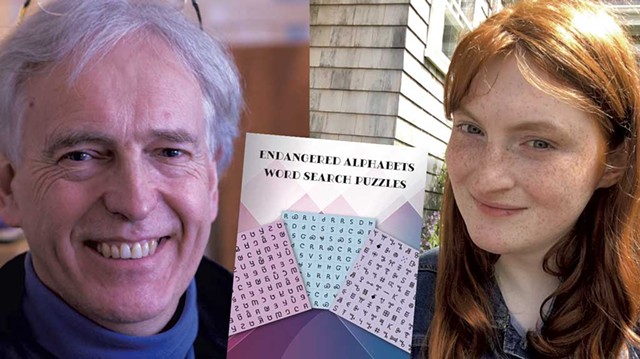
- Courtesy Photos
- Tim Brookes and Charlotte Artemis Walsh
What do you get for the word nerd in your life who has everything — and is a glutton for punishment? How about Endangered Alphabets Word Search Puzzles, the new book from Vermont-based Endangered Alphabets Project? Sold on the nonprofit's website, the book consists of word searches written in 11 obscure scripts from around the world that will delight and perplex casual solvers and language scholars alike.
"People are interested in languages," said Endangered Alphabets Project founder Tim Brookes, who created the book with EAP researcher Charlotte Artemis Walsh.
Brookes, who has a dry British wit, laughed when asked who the target audience might be. Then he offered insight into how puzzles written in rare scripts such as Coptic (a hybrid of Greek and Egyptian) and Syriac (a variant of Aramaic, the language spoken by Jesus) might inspire conversation about the role of language in preserving imperiled cultures.
"What I'm really hoping is that some of these really interesting issues about symbol processing and cognition and language emerge out of this," he said.
Though they're short, Brookes and Walsh's puzzles are fiendishly difficult to solve. For one thing, most are built from unfamiliar glyphs and symbols.
The book contains two puzzles in each script, and they function like traditional word searches in that words can be found vertically, horizontally and diagonally, but never backwards. Just remember that not all scripts are read left to right. And some, such as Bassah Vah, are what's called boustrophedon, meaning lines are read in alternating directions: left to right, then right to left and so on.
The puzzles are disorienting to the point where, Brookes noted, your eyes might well cross as you try to solve them. In short, he said, they have a way of "making you feel really stupid." And that's part of the idea.
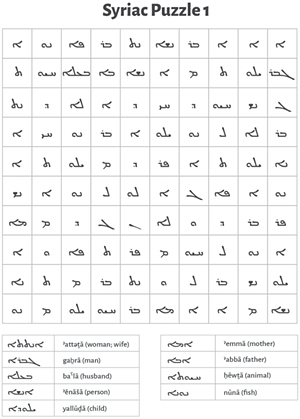
- Courtesy Of Endangered Alphabets Project
- Syraic Puzzle 1
"If the puzzles were straightforward, even if the scripts came from all these different cultures, it would be like visiting the zoo," Brookes said. When people from privileged backgrounds observe other cultures, he explained, "there is a certain sense of tourism."
"The assumption is that we do it right, and they do it differently," he continued. Exposure to foreign scripts has a way of challenging that perception.
"When you're out among the endangered alphabets, you realize that the reason why the Latin alphabet is the most popular and widely used alphabet is not because it's better or more efficient or the easiest to learn, which it isn't," Brookes said, before tossing out a Warren Zevon reference: "It's because at a crucial point in history it had the most lawyers, guns and money."
The book's origin, like that of the Endangered Alphabets Project itself, goes back to Brookes' work several years ago with a man from the Chittagong Hill Tracts of Bangladesh who ran a school for indigenous kids. The man was one of the Marma, an indigenous people whose culture is eroding due to what Brookes called targeted marginalization by the Bangladeshi government.
"When Bangladesh was founded, the government denied there were any indigenous people and non-Bengali people in the country," Brookes said. With citizenship and human rights withheld from groups such as the Marma, a school for indigenous kids was a radical and risky endeavor.
"This guy could have been arrested and disappeared at any time," Brookes said of the school's founder.
Because all school materials in Bangladesh are written in Bangla, indigenous students had no curricula in their own language or scripts. Brookes helped devise wall charts, posters and storybooks in a number of indigenous languages. He also began creating games, including word searches.
That was a particular challenge, he noted, because "I don't speak any of those languages." But he'd observed, "If you want kids to learn anything, you've got to convert it into games."
Word games are "script rehearsal," Brookes explained. From childhood games such as Hangman to the more sophisticated Boggle or Scrabble, they're critical pieces of becoming fluent in a language.
Brookes tasked Walsh, a journalist and former student of his at Champlain College, with sourcing material for the word searches and compiling them in different scripts. Deciding which scripts to include was generally a matter of logistics.
"Invariably it boiled down to 'Who could we get hold of who is smart enough to speak English, because we're too dumb to speak their language?'" Brookes explained.
With help from sources around the world, Walsh built the puzzles. Brookes wrote script profiles to accompany each, offering historical and linguistic context and (often) details on how and why they're endangered.
"Some of these scripts were widely used and highly significant," Brookes said, "but their culture was overrun or took a wrong turn or was slaughtered."
His goal is to "get people across that divide" between diversion-seeking tourists and those committed to a culture's survival, so they're "standing among the endangered alphabets and looking at them from that point of view."

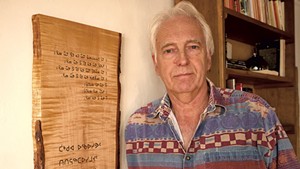
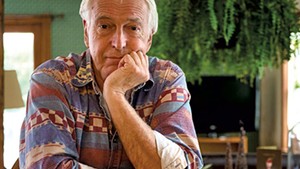
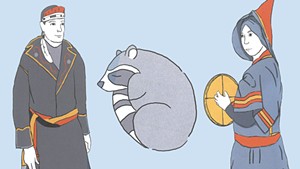
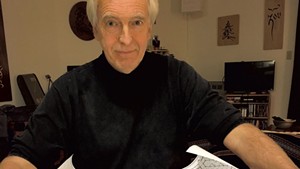






Comments
Comments are closed.
From 2014-2020, Seven Days allowed readers to comment on all stories posted on our website. While we've appreciated the suggestions and insights, right now Seven Days is prioritizing our core mission — producing high-quality, responsible local journalism — over moderating online debates between readers.
To criticize, correct or praise our reporting, please send us a letter to the editor or send us a tip. We’ll check it out and report the results.
Online comments may return when we have better tech tools for managing them. Thanks for reading.